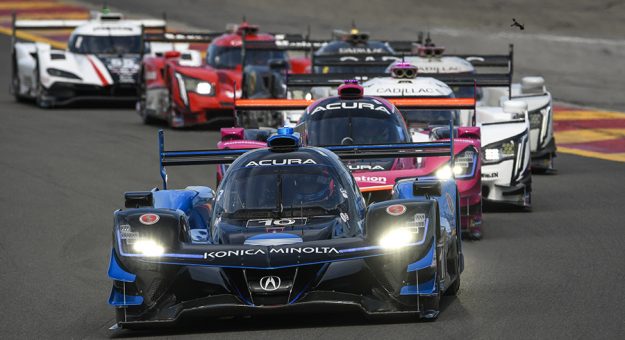DAYTONA BEACH, Fla. – In early 2020, officials from the Automobile Club de l’Ouest, the Fédération Internationale de l’Automobile and the International Motor Sports Ass’n announced their intention to work hand-in-hand to create a joint top class for endurance racing.
The three parties have now come to an agreement on the technical specifications for the new category. This agreement means LMH prototypes will be able to compete in the IMSA WeatherTech SportsCar Championship beginning in 2023.
The convergence work done by the ACO, the FIA and IMSA to align their technical regulations aims to allow cars with different technical definitions to compete alongside one another on both sides of the Atlantic, in the FIA World Endurance Championship and the WeatherTech Championship. They are:
- the LMH, or Le Mans Hypercar, officially introduced in 2021
- the LMDh, or Le Mans Daytona h, officially introduced in 2023.
“What we achieved as a group a few weeks ago in Paris has the potential to revolutionize prototype sports car racing all over the world,” said IMSA President JOhn Doonan. “The stage is set for a highly competitive top category that will include many of the world’s greatest automotive manufacturers, showcasing relevant technology in the world’s most prestigious endurance races. Collectively, we have an opportunity to engage with the next generation of endurance sports car racing fans and elevate our sport to the highest levels. I cannot be prouder of the spirit of collaboration between our IMSA team, our colleagues at the ACO and FIA, and all of our automotive partners.”
At a high-level technical meeting bringing together the ACO, the FIA, IMSA and all the manufacturers officially involved in LMDh and LMH programs, the parties came to an agreement that aims to balance the performance of these different types of car (most notably the powertrain and the four-wheel drive set-up) so that LMH cars can compete in the IMSA WeatherTech SportsCar Championship.
The specifics for four key technical elements – tire fitment, acceleration profile, braking capability and aerodynamics – were converged and agreed upon by ACO, FIA, and IMSA prior to being approved by the WMSC on July 8.
Key Technical Elements
Tires (Front/Rear Width in cm):
AWD: 31/31
RWD: 29/34
Acceleration Profile:
AWD: Activation speed deployment will be BOP tool (removed from TR) and it will be monitored with PDST (from Speed 1 to Speed 2)
AWD: Due to the track variations in global competition, there will be two BOP activation speeds (dry/wet linked to tire fitted to the car). With our current knowledge, a 120-160 kph range would be implemented
LMDh: Control software to limit the contribution of eMotor to traction control capability
Braking Capability:
AWD & RWD: Total differential potential on coast identical on all cars (AWD = Fr + Rr, RWD = Rr)
delta torque front axle + delta torque rear axle < Limit overall delta torque
Limit overall delta torque = function (virtual engine drag power, virtual locking ratio)
AWD: Front differential with a zero-lock mechanism on coast (twin or single eMotor)
delta torque front axle < limit delta torque front (to cope for internal friction)
Aero:
LMH
Homologation = Sauber
Taking part in IMSA = wind tunnel characterization in WindShear
LMDh
Homologation = WindShear
Taking part in FIA WEC = wind tunnel characterization in Sauber
The final technical regulation language pertaining to the above will be developed jointly by ACO, FIA and IMSA.
LMH eligibility will also require an individual business agreement between each manufacturer and IMSA, which respects its sporting regulations.
The initial objective shared by the ACO, the FIA and IMSA – giving constructors the opportunity to enter the same car in the world’s most prestigious Endurance races – will thus be achieved in 2023.
“This major announcement stems from our ambition to forge a common future for endurance racing,” said Pierre Fillon, President of the Automobile Club de l’Ouest. “We have all worked together to achieve this landmark agreement and I would like to thank all the stakeholders very sincerely. It is wonderful news for teams and fans alike and maps out a bright future for endurance. The manufacturers dreamed of being able to participate in the greatest endurance races in the world with the same model of a car: this will now be reality.”
“The FIA, ACO and IMSA have been working towards a common future where teams running in LMH and LMDh can race on both sides of the Atlantic,” said
Richard Mille, president of the FIA Endurance Commission. “Today we can see that the convergence has taken a step closer to reality, which is great news for all of us involved in endurance racing. The principles have been agreed by all parties. The dream of teams and manufacturers being able to compete in all of the top endurance races with the same car for the first time is now at hand. This represents a significant moment in the history of motor racing.”
